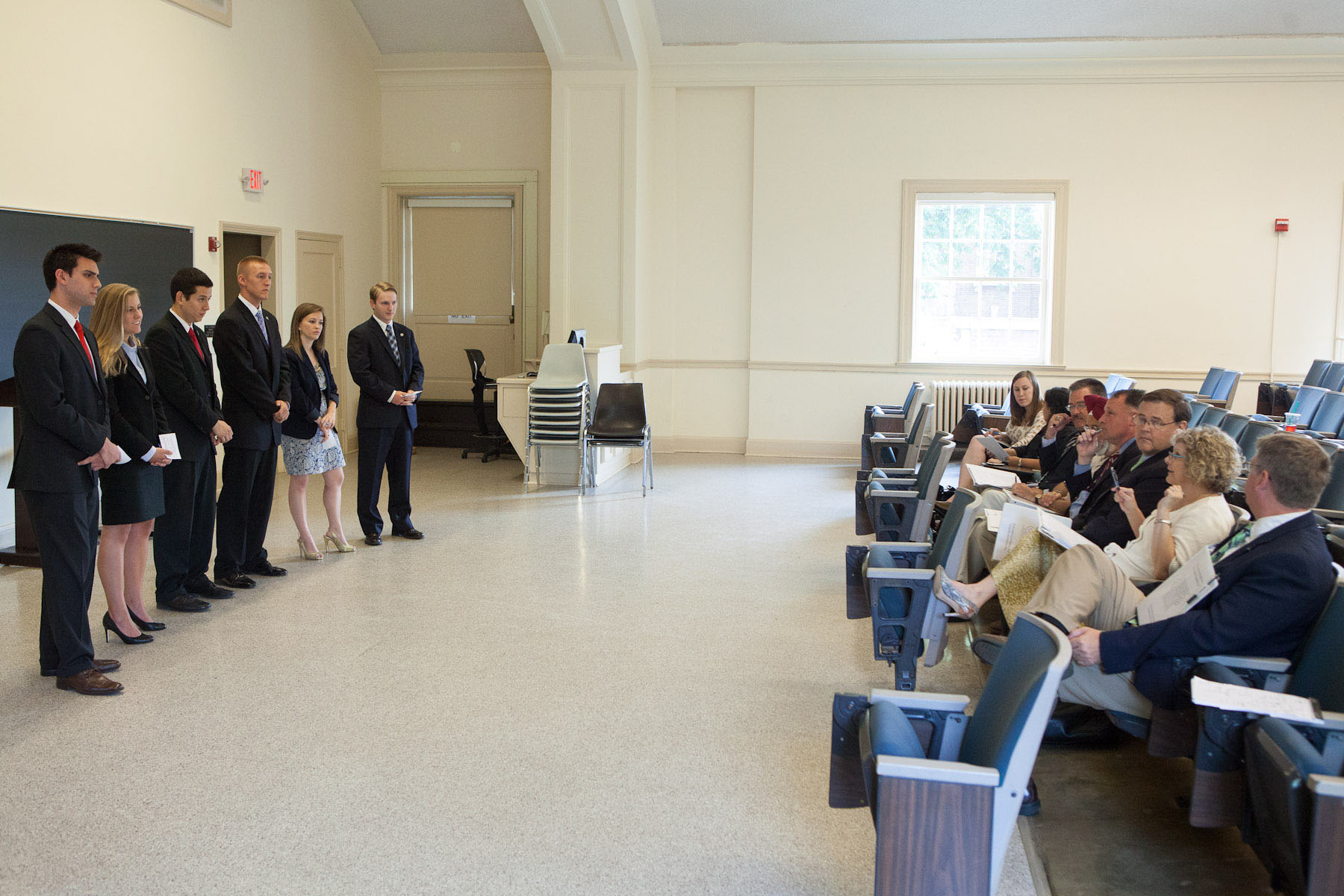On Friday morning, a state senator, state delegate, mayor and other policymakers listened as students in the University of Virginia Sorensen Institute for Political Leadership's College Leaders Program presented their final projects. Potentially, these 17 students could become the authors of new state legislation.
In the past two years, four bills proposed by program participants have been introduced to the Virginia General Assembly. Three have become state law.
The College Leaders Program aims to prepare young leaders for responsible citizenship, to connect youths of different backgrounds and philosophies and to promote youth involvement in the democratic system. Students go through a rigorous application process before being selected to participate in the program. The participants come from universities all across the state and pursue majors in many different fields of academia.
Del. Ed Scott (R-Culpeper), who attended Friday's presentations in Maury Hall, said that if he believes there is merit to one of the policy proposals, he will introduce it to the General Assembly, just as he did last year. Through his patronage and the students' advocacy, a bill to give grants to beekeepers was passed by the General Assembly and will become law July 1.
Joining Scott at this year's presentations were Sen. Creigh Deeds (D-Bath), Charlottesville Mayor Satyendra Huja and former legislative aide and policy expert Connie Jorgensen. The three presentations lasted 20 minutes each – 10 minutes for the student groups to present their proposals and 10 to answer questions posed to them by the panel of guest judges.
Scott said that this exercise will give students real-world exposure. "They'll be answering questions that they'd face while advocating in the General Assembly," he said.
He also said that the presentations will be a lesson in bipartisanship. "One important thing is to understand both sides when articulating your ideas," he said. "Hopefully by the end of this, they will be able to understand their position, but also the other side."
Real-life experience and values such as bipartisanship are cornerstones of the Sorensen Institute's programs, which not only include the College Leaders Program but the High School Leaders Program, the Political Leaders Program and the Candidate Training Program.
The projects presented Friday were the culmination of four weeks of hard work and intense coursework. The curriculum focuses on three primary modules: the Informed Citizen, the Thoughtful Citizen and the Active Citizen. Participants learn first about the core functions of government, then how public policy develops, and finally, skills to help them become effective advocates.
At the end of the fourth week, students present their projects. Working together in groups, they apply the knowledge they have gained through the program to develop concrete proposals that address specific public policy issues. Each group is assigned a broad aspect of policy to focus on; this year, the groups presented projects on economic, educational and transportation issues.
The education group proposed fixed-rate tuition for four-year public universities, while the transportation team advocated an expanded curriculum on emergency preparedness in driver's education courses. The economic group, which included rising U.Va. fourth-year student Marco Segura, decided to emphasize the environment in their proposal, suggesting a one-cent fee on plastic bags to help reduce litter in the Chesapeake Bay and eventually increase business revenues.
Segura said that the program showed him that there were multiple ways to become involved in government.
"There's no doubt in my mind that this program facilitated access to very different ways of approaching policymaking," he said. "I learned that there is not just one way to impact policy."
Bob Gibson, executive director of the Sorensen Institute, said the goal of the projects is to teach students real-life legislative and policy skills and to give them the opportunity to incorporate what they learned in other parts of the program.
One of the most valuable aspects of the program, though, lies outside the curriculum and within the students themselves, Gibson said. He explained that the institute tries to draw student participants from all parts of Virginia, to fully represent the different perspectives within the state. This year, students came from 10 different Virginia universities.
"Virginia is a diverse state, and we live in communities that tend to be like each other. Mixing with others helps individuals to see the whole scope of the state," he said.
Segura said the variety of perspectives enriches the program and creates a learning environment that emphasizes cooperation and reaching across the aisle.
"There are lots of different perspectives in the commonwealth, and what you think is not a priority is a priority to another region," he said. "The spirit of the Sorensen Institute is to work with what you have, with the people you have, to achieve the higher goal of improving our great state."
– by Lisa Kessler
Media Contact
Article Information
June 25, 2012
/content/college-leaders-gain-real-life-skills-and-present-projects-could-become-law

